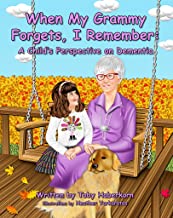When My Grammy Forgets, I Remember: A Child's Perspective on Dementia
Reading Guide
By Toby Haberkorn
Illustrated by Heather Varkarotas
About this Series
The MSU Extension Alzheimer's Awareness for Children Storybook program is designed to teach children about a form of dementia.
The goals of the program are 1) increase awareness andknowledge about Alzheimer's (a form of dementia) and 2) provide supportive resources to children and families when they have a loved one diagnosed with Alzheimer's.
The authors of the reading guides are:
- Jennifer Munter, Volunteer Program Coordinator. Jennifer is a former Early Childhood Educator and has worked with children and their families for over 15 years.
- Marsha A. Goetting, MSU Extension Family Economics Specialist
- Keri Hayes, MSU Extension Program Assistant
Brief Summary
A young girl is worried when she notices her Grammy is having trouble reading and
remembering things.
The young girl's Mom explains to her Grammy has been diagnosed with Alzheimer's.
The young girl shows her Grammy the same unconditional love they shared with one another
before Alzheimer's reshaped their lives.
Questions to Ask
- The girl and her Grammy do lots of activities together. What are some of those activities?
- The girl noticed something was wrong with her Grammy. Grammy started acting differently.
What sort of different things was Grammy doing?
- The girl is worried about Grammy, Mom explains to her what is wrong with Grammy.
What part of Grammy's body was making her forget things and act differently?
- People with Alzheimer's often call people by the wrong name. What did Grammy call her granddaughter? Whose name was it? How did the the girl react?
- Grammy continued to act differently throughout the book. What does the girl always do to show Grammy she loves her?
Activity Enrichment
- Brain: Download and print two healthy brain activity sheets. Explain to your child that
our brains contain all our thoughts, memories, and feelings. Have them draw what
they are thinking about. You can help them if needed. On one of the brain pages you
may also illustrate what you are thinking about.
Common Reactions
- Worried: A child may feel worried when a grandparent begins acting differently and can no
longer take care of themselves.
- Uncertain: A child may feel uncertain about how a grandparent feels about them.
- Sad: A child may feel sad when they realize their grandparent is different.
- Love: A child may feel love for a grandparent with Alzheimer's no matter what has changed.
Other Storybooks and Reading Guides
Other Storybooks and Reading Guides can be found at: https://www.montana.edu/extension/alzheimers/booksandreadingguides.html
Funding for purchase of the storybooks in this program have been made possible by
a grant from the Montana Geriatric Education Center at the University of Montana,
AARP Montana, and by the Endowment fund from National Extension Association of Family
& Consumer Sciences (NEAFCS).




